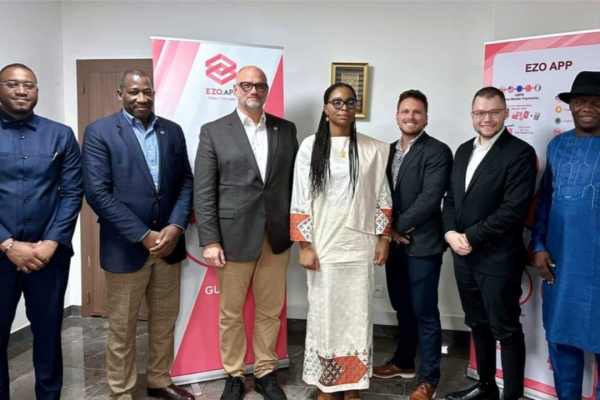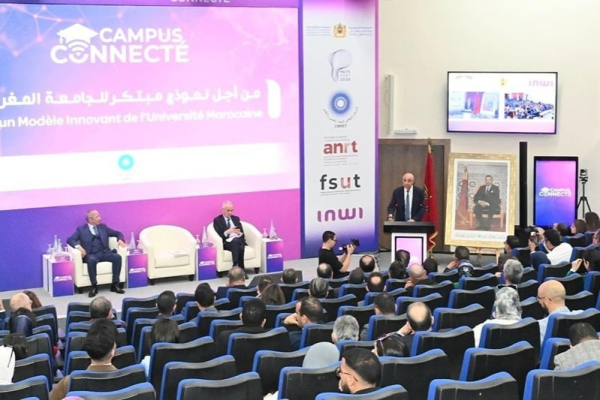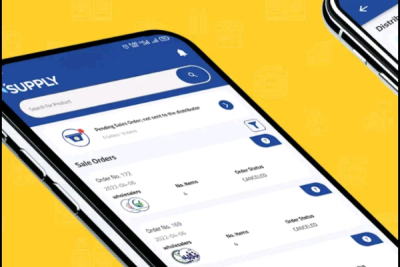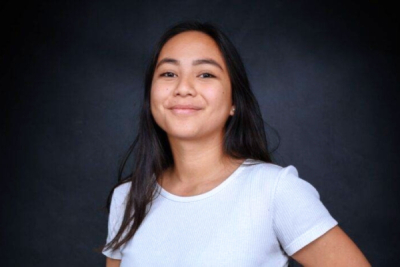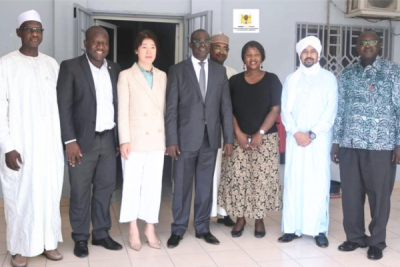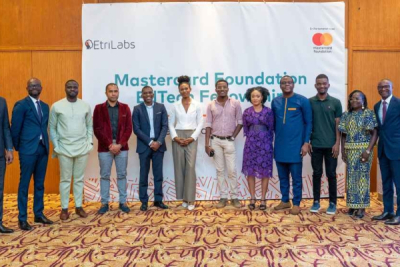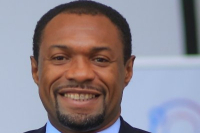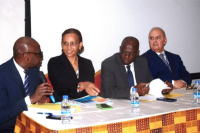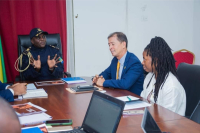In Guinea, a large portion of its population lacks access to formal banking. To spur economic development, initiatives that improve financial inclusion are crucial.
On Tuesday, June 18, Guinea's Minister of Posts, Telecommunications, and Digital Economy, Rose Pola Pricemou (photo, center), met with a delegation from the Canadian company EZO, led by co-founder Charles-André Bergeron. The visit aimed to propose a financial solution tailored to the Guinean market, addressing the growing need for the digitalization of financial services in the country.
According to the Ministry of Digital Economy, discussions focused on the potential implementation of the EZO financial application in Guinea, the digitization of financial services, and the development of financial inclusion. Ms. Pricemou emphasized the importance of such initiatives in improving access to financial services for both rural and urban populations.
EZO's visit to Guinea is part of its international expansion strategy. The company plans to establish itself in Tunisia in the coming months and offers an automated and autonomous solution covering all financial activities. Its system comprises three main components: customer inclusion (swap system), payment, and savings. The application also allows users to receive money directly on their phones, with payment options available regardless of the currency origin.
Moreover, EZO integrates portfolio management and microcredit features, which could transform Guinea's financial landscape by offering comprehensive banking services via a digital platform.
In Guinea, the EZO delegation also met with officials from the Central Bank and other major banks to discuss solutions for providing all citizens with access to essential financial resources for their development.
Samira Njoya
The Moroccan government aims to connect educational institutions as part of its digital transformation ambitions. Starting in 2021, approximately 1.2 million SIM cards have been distributed to students, allowing them free access to the internet.
American wireless network provider Cambium Networks announced on Tuesday, June 18, the deployment of 18,000 Wi-Fi access points to provide high-speed internet connectivity in 12 major public universities in Morocco. The project covers over 200 campuses and benefits 1.3 million students, educators, and administrative staff.
The campuses are equipped with Cambium Networks' Wi-Fi 6 solutions, both indoors and outdoors. These solutions were designed and deployed in collaboration with 3GCOM, a service integrator and partner for the project. The partners integrated planning tools, contactless provisioning, streamlined installation, and centralized cloud management into the existing systems to ensure optimal performance.
The deployment of Wi-Fi access points in Moroccan universities is part of the "Connected Campus" program launched in 2021, aimed at providing students with free and secure access to digital tools. Over 1.2 million SIM cards have been distributed to students in partnership with telecom operators. This effort is part of the government's initiatives to accelerate the transformation of the higher education, scientific research, and innovation ecosystem.
"Flexible learning, online testing, and video collaboration with media-rich content requires stable, reliable and affordable performance. Our purpose-built technologies uniquely address density and scale while delivering best in class experience—ensuring uninterrupted learning while remaining affordable," said Morgan Kurk, CEO of Cambium Networks.
Isaac K. Kassouwi
Set up by three tech entrepreneurs with over 25 years of experience combined, the solution aims to facilitate the distribution of pharmaceutical products.
i'SUPPLY is an e-health solution developed by an Egyptian startup, enabling pharmacies to restock pharmaceutical products via its web and mobile platforms. Founded in 2021 by Ibrahim Emam, Moustafa Zaki, and Ramzy Mohamed, the Cairo-based company has quickly made a significant impact on the market.
On June 6, i'SUPPLY raised $2.5 million to support its expansion plans, improve financing capabilities for small and medium-sized pharmacies, and advance its fintech offerings. "Our sights are set even higher as we strive to obtain a license from the Egyptian Financial Regulatory Authority to meet the evolving financing needs of small and medium-sized pharmacies. Our unwavering commitment to meeting the escalating market demand for funding, addressing working capital shortages among pharmacies and small distributors, remains at the core of our mission," stated Ibrahim Emam.
The solution features a mobile application available on iOS, AppGallery, and Android, with over 10,000 downloads on the Play Store. After downloading, users create an account to access the startup's services. Through its digital marketplace, they can source pharmaceutical products from numerous distributors.
i'SUPPLY aims to resolve all supply chain issues in this segment. It provides users with tools for real-time market information and analysis. This includes a comprehensive view of product distribution, stock levels, commercial performance, supply chain efficiency, and market trends.
The Egyptian healthtech boasts over 10,000 pharmacies on its marketplace and more than 200 small and medium-sized distribution companies offering a portfolio of over 10,000 pharmaceutical products.
Adoni Conrad Quenum
At just 19 years old, she launched her first startup and contributed to the fight against unemployment through innovative training programs. Her company has achieved immense success, earning her numerous awards and distinctions.
Matina Razafimahefa (photo) is a renowned entrepreneur in Madagascar's tech industry. She is best known for founding the educational technology startup Sayna, alongside her mother, Nirina Rahoeliarivahy. As CEO, Matina aims to make education accessible to Africans through gamified online training programs.
Founded in 2018, Sayna is an edtech and crowdsourcing platform that allows users to acquire technological skills. Students who complete these courses can then access paid micro-tasks offered by companies, helping to reduce unemployment.
Beyond Sayna, Matina co-founded and co-chairs French Tech Antananarivo, a community launched in 2019. This initiative brings together startup founders, investors, institutions, and other key players in Madagascar's tech ecosystem. French Tech Antananarivo serves as a hub for innovation, technological experimentation, and talent support.
Born in Côte d’Ivoire and raised in Madagascar, Matina pursued her studies at the University of Paris 1 Panthéon-Sorbonne in France, where she earned a degree in political science in 2020. Between 2018 and 2019, she was the Head of Solidarity Engagements at Maltem Consulting Group. In 2023, she served on the scientific committee of the Assises de la Transformation Digitale en Afrique.
Matina's achievements have been widely recognized. In 2020, she was a finalist in The Anzisha Prize, which honors the best young entrepreneurs in Africa. In 2022, she was named one of Forbes Africa's 30 under 30 shaping the future of the continent. Additionally, at Vivatech 2022, Sayna won the "Making Work Flexible" challenge organized by ManpowerGroup, a company specializing in recruitment solutions.
Melchior Koba
Chad's Minister of Communications, Digital Economy, and Digitalization of Administration, Boukar Michel, held a meeting on Tuesday, June 18, with a delegation of American, Canadian, and Turkish investors. The delegation was accompanied by Kitoko Gata Ngoulou, Chad's ambassador to the United States. The discussions focused on the digital economy and the digitization of key sectors within the country. Boukar Michel emphasized that such partnerships would address the telecommunications needs of the population, highlighting the importance of international collaboration in advancing Chad's digital infrastructure and services.
EtriLabs, a Beninese startup incubator with a presence in Benin and Senegal, announced on Thursday, June 13, in partnership with the Mastercard Foundation, the selection of six startups operating in educational technologies for the inaugural cohort of the Mastercard Foundation EdTech Fellowship. The program aims to accelerate 36 edtech startups over a period of three years.
The selected startups—Irawo, Sewema, Logeco, Blemama, Tama, and Esseyi—will benefit from an eight-month acceleration program, mentorship, expert advice, and non-equity funding of $75,000.
Founded in 2009, Akendewa aims to invigorate the internet and mobile industry by supporting startups, amateurs, enthusiasts, freelancers, and entrepreneurs. The organization brings together technology enthusiasts and professionals dedicated to advancing information and communication technologies (ICT).
One of Akendewa's notable initiatives is AllDevCamp, an intensive program designed to train prolific application developers. This program provides an ideal framework for the design, development, and distribution of web and mobile applications in Africa.
Jean-Patrick Ehouman is also the co-founder and director of SheIsTheCode, a program launched in 2015 that trains and supports African women in technology and entrepreneurship. This program equips them with computing skills, fosters professional leadership, and helps digitalize businesses, NGOs, and administrations.
Before Akendewa, Jean-Patrick founded AllDenY in 2008, a startup specializing in web and mobile technologies. AllDenY assists businesses in identifying suitable technologies and strategies, developing technological solutions, and providing expert-led training. He served as CEO of the company until 2016.
Jean-Patrick Ehouman holds a university degree in electronic engineering and industrial computing from the University of Poitiers, obtained in 2004. He also has a professional bachelor's degree in computer systems and software from Aix-Marseille University, earned in 2005. In 2014, he completed a business and entrepreneurship program at the University of Texas.
He began his career as a software developer in 2006 and became co-director of Founder Institute, a global startup accelerator, in Côte d'Ivoire in 2015.
In 2013, he won the first UNESCO Prize for Youth Entrepreneurship and Culture of Peace in Africa. In 2014, he was selected among the 500 young leaders of the Young African Leaders Initiative (YALI).
Melchior Koba
The Ivorian government is intensifying its efforts to enhance the employability of young people and women through information and communication technologies (ICT). The goal is to reduce unemployment and stimulate technological innovation in the country.
The United Nations Industrial Development Organization (UNIDO), in partnership with the Ministry of Commerce and Industry and the Ministry of Digital Transition and Digitalization, launched the development of the National Industry 4.0 Strategy in Côte d'Ivoire on Friday, June 14. This initiative was introduced during a dedicated workshop.
The strategy, currently under development, will focus on skill development, support for investment and financing, and assistance to innovation and startup ecosystems to deliver 4.0 technological solutions tailored to business needs. It also emphasizes partnerships, alliances within the ecosystem, international cooperation with technical and financial partners, and awareness-raising efforts.
This initiative is part of the "Employment4Youth: Industry 4.0 to foster youth employment in Tunisia and Côte d'Ivoire" project, led by the Ivorian government and implemented by UNIDO. Launched in 2022, the project aims to increase youth employment and improve working conditions by structuring and consolidating a digital ecosystem, particularly within Industry 4.0. The project is funded by the German Federal Ministry for Economic Cooperation and Development (BMZ) under the special initiative "Decent Employment for a Just Transition."
In Côte d'Ivoire, this project is expected to create 13,000 jobs, including 3,000 direct jobs, by 2025 across various private sectors such as social and ecological transformation, renewable energies, ICT, and agro-industry, with a total investment of USD 30 million.
Samira Njoya
Kenya aims to become a leading technology hub in East Africa. To achieve this goal, the country has secured investment from Poland for its ongoing smart city project, which began in 2012.
Farada Group, a Polish company specializing in unmanned aerial systems (UAS), has announced that it has obtained all necessary documents from the Kenya Civil Aviation Authority (KCAA) to set up a manufacturing plant in Konza Technopolis, Kenya. The goal is to make the country its main hub to serve the African market.
Speaking on the matter, Adam Cudny, President of Farada Group, stated: “We plan to acquire a plot of land here in Konza Technopolis to establish a drone manufacturing company for Kenya and the whole of Africa. [...] We have all the necessary approvals and we have set up a local company to implement the project.”
This Polish investment is part of the state visit of Polish President Andrzej Duda to Kenya in February. The two countries decided to collaborate in various sectors, and Farada Group's leaders, present during the visit, established connections with Kenyan authorities. On this occasion, they donated a drone to the Kenya Wildlife Service (KWS) to help monitor the country’s national parks.
The drones manufactured by the Polish company are used for wildlife surveillance, monitoring power lines, responding to natural disasters (such as floods and wildfires), and delivering essential goods like medical supplies. Additionally, earlier this month, the Korea Eximbank signed two agreements with Kenyan authorities to invest $238 million in Konza Technopolis. The project, once abandoned, has regained momentum in recent years and is central to Kenya’s national development plan, Vision 2030.
Adoni Conrad Quenum
On Friday, June 14, the Minister of Digital Economy and New Information Technologies, General Bonjean Frédérik Mbanza, met with a delegation from the United Nations Development Programme (UNDP) in Gabon. Led by its Resident Representative, Francis James, the UNDP delegation presented the University Pods (UNIPODS) incubator program to the minister. This initiative is established within major public universities across Africa.
More...
Madagascar plans to extend its surveillance camera project beyond the capital, Antananarivo, to other major cities in the country. The initiative was discussed during a meeting between Tahina Razafindramalo, Madagascar’s Minister of Digital Development, Posts, and Telecommunications, and Ji Ping, the Chinese Ambassador to Madagascar, held on Thursday, June 13, at the ministry’s headquarters in Antananarivo. Originally, the project included the installation of 1,200 surveillance cameras in the Malagasy capital.
Angola's National Institute for the Support of Micro, Small, and Medium Enterprises (INAPEM) signed a memorandum of understanding with Chinese tech giant Huawei last week, according to Angola Press Agency on June 14.
The partnership aims to strengthen Angola's national entrepreneurial ecosystem by fostering innovation and supporting the development of startups.
With over a decade of experience across diverse fields, he is passionate about financial inclusion. His goal is to build a world where everyone has equal access to the tools and resources needed for financial empowerment.
Ousmane Seidy Diallo (photo) is an experienced Guinean software developer and tech entrepreneur. He is the founder and CEO of MuduPay, a company revolutionizing the mobile payments sector in Africa and beyond.
Founded in 2021, MuduPay offers an innovative mobile payment platform that simplifies financial transactions in Africa. The solution allows users to make payments, transfer money, and shop online using their mobile phones, even without a traditional bank account. The goal is to include unbanked populations by providing a simple and secure way to manage their finances. With advanced security protocols, MuduPay ensures reliable transactions.
MuduPay also offers two other solutions to meet its clients' needs. The first, MuduBiz, is a business management solution designed for professionals. It includes features such as inventory management, payment processing, and employee management.
The second, MuduExpress, is designed for diaspora members wishing to send money to Africa. It allows for secure and hassle-free money transfers and is available in several countries, including Guinea, Ghana, Nigeria, Senegal, Sierra Leone, Ethiopia, and Côte d'Ivoire.
Ousmane Seidy Diallo holds a degree in network security obtained in 2012 from the American training center Training SOL. After working for three years as a freelance software engineer, he joined the startup eHealth Africa in 2014 as a software developer. In 2018, he became the lead engineer at Ocean Nexus, a software development company.
In 2019, he worked as a consultant at Andela and a software developer at Venzee Technologies, a Canadian company specializing in commerce solutions. He then joined Easer Solar, a company providing renewable energy in West Africa, as chief technology officer.
Melchior Koba
The Congolese government aims to enhance its ability to provide public services tailored to the needs of the population through digital means. This initiative is a key objective of the Digital Transformation Acceleration Project.
On Friday, June 14, Léon Juste Ibombo (photo, center), Congolese Minister of Posts, Telecommunications, and Digital Economy, launched a high-speed internet connection project for public administrations nationwide. The six-month project, valued at €3.2 million (around $3.5
million), is being undertaken by Silicone Connect.
The initial phase will focus on the Ministries of Interior, Posts and Telecommunications, Health, Justice, Social Affairs, and Public Service. It involves installing Wi-Fi access points and implementing digital services.
Minister Ibombo anticipates improved connectivity for civil registry centers within the public service sector. This will strengthen the integrated civil registry system, enabling efficient synchronization and better management of civil data. "Healthcare and Justice sectors will also benefit from increased connectivity in their respective registry centers, hospitals, and courts, ensuring smooth and transparent data management" he added.
This initiative follows the deployment of high-speed internet in Congolese public universities two months prior. It aligns with the Digital Transformation Acceleration Project (PATN). PATN aims to expand high-speed internet access for underserved populations and enhance the government's ability to deliver targeted public services digitally. The World Bank is supporting the $100 million project, with an allocated budget of approximately $64 million for 2024.
By 2025, the Congolese government aims to achieve equitable access to digital services for all citizens. "As digital technology becomes a critical pillar of our development, this project aligns with the President's vision to prepare Congo for a digital, inclusive, and dynamic future the information society," Minister Ibombo declared
Isaac K. Kassouwi


